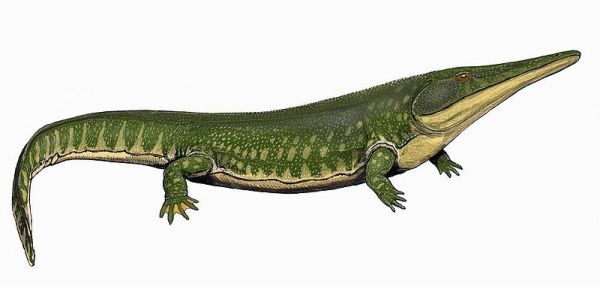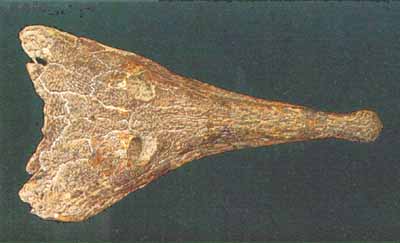|
|
Temnospondyli |
| The Vertebrates |
Archegosauroidea |
Temnospondyli: Archegosauroidea
Taxa on this Page
- Archegosauroidea X
- Limnarchia X
- Stereospondylomorpha X

Archegosaurus decheni, Early Permian of Germany. Life reconstruction by Dmitry Bogdanov.
The Archegosaurs were group of medium to very large crocodile- or gavial-like amphibians, common in the Permian of what is now Western and Eastern Europe (and doubtless elsewhere as well). Archegosaurus decheni, shown above, is a typical form. These animals represent a transitional type between the large terrestrial and semi-aquatic Permo-Carboniferous forms (e.g. Eryopoidea and similar) and the more specialised and totally aquatic Stereospondyls (although in the great tree of life, all species are transitional, apart from those that die out without leaving descendents. Hopefully more material will be added on them in due coaurse. MAK111122
Descriptions
Limnarchia:
Range: Permian to middle Cretaceous.
Phylogeny: Temnospondyli::: Euskelia + *: Dvinosauria + Stereospondylomorpha.
$ paraquadrate foramen on occipital face of quadratojugual; $ perforated anterior palatal fossa; $ ectopterygoid toothrow; $ pterygoid with conical recess dorsal to pterygoid - parasphenoid articulation; $ maxilla sutured to vomer; vomer denticles absent; $ discrete postglenoid area on mandible; relatively elongate interclavicle.
Links: Limnarchia after Yates & Warren, 2000; Phylogeny and Apomorphies of Temnospondyls;
References: Yates & Warren (2000). 020414.
Comment: If Dvinosauria has a more basal position (Ruta et al 2007) then either Limnarchia is diphyletic and invalid, or Limnarchia minus Divinosauria, and Stereospondylomorpha, become synonymous MAK111113
Stereospondylomorpha: The stereospondylomorphs are the more significant of the two temnospondyl groups which survived the Permian. The name refers to the structure of the vertebrae, in which the intercentrum was the dominant or only component of the centrum (i.e. the pleurocentrum was absent).
Range: Early Permian to middle Cretaceous.
Phylogeny: Limnarchia: Dvinosauria + *: Archegosauroidea + Stereospondyli.
Characters: $ Jugal extends anterior to orbit; $ prefrontal sutured to jugual; $ maxilla-nasal suture; $ "arcadian groove" on the postglenoid area of the mandible. 020414.
 Archegosauroidea: Archegosaurus, Bashkirosaurus, Cheliderpeton, Collidosuchus, Intasuchus, Konzhukovia, Melosaurus, Platyoposaurus, Prionosuchus, Sclerocephalus, Tryphosuchus
Archegosauroidea: Archegosaurus, Bashkirosaurus, Cheliderpeton, Collidosuchus, Intasuchus, Konzhukovia, Melosaurus, Platyoposaurus, Prionosuchus, Sclerocephalus, Tryphosuchus
Range: Assellian
- Wuchiapingian
 Phylogeny: Stereospondylomorpha: Stereospondyli + *.
Phylogeny: Stereospondylomorpha: Stereospondyli + *.
Introduction: These are a diverse assemblage of mostly large to very large crocodile-like semi-aquatic Permian forms. The constitute a transitional grade between the basal, rhachitomous temnospondyls and the more specialised aquatic families (Stereopondyls) which dominated the Triassic waterways.
Characters: premaxilla without triangular process projecting posteriorly, medial to the naris; premaxilla with rugose, medial tubercle between anterior palatal fossae.
Image: (skull) Platyposaurus from Gondwana Studios
Links: Phylogeny and Apomorphies of Temnospondyls; PaleoNET | Библиотека new Melosaurus species and revision of related taxa); ATW030927.
 Archegosauroidea: Archegosaurus, Bashkirosaurus, Cheliderpeton, Collidosuchus, Intasuchus, Konzhukovia, Melosaurus, Platyoposaurus, Prionosuchus, Sclerocephalus, Tryphosuchus
Archegosauroidea: Archegosaurus, Bashkirosaurus, Cheliderpeton, Collidosuchus, Intasuchus, Konzhukovia, Melosaurus, Platyoposaurus, Prionosuchus, Sclerocephalus, Tryphosuchus Phylogeny: Stereospondylomorpha: Stereospondyli + *.
Phylogeny: Stereospondylomorpha: Stereospondyli + *.